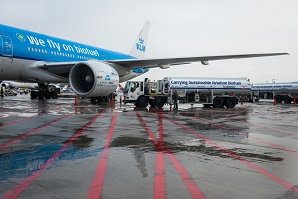Just five years ago, flying on bio jet fuel seemed an impossible dream. But SkyNRG developed a powerful concept that allows it to offer this product at an increasing number of airports. Its funding and co-creation model allows the company to supply the fuel at an affordable price. SkyNRG’s goal is to offer sustainable jet fuel at a competitive price with fossil jet fuel. What is the company’s secret?
 SkyNRG’s strategy
SkyNRG’s strategy
For an airline, using sustainable jet fuel is the only way to significantly reduce its carbon footprint. Just five years ago, the proposition for bio jet fuel seemed to be impossible because of its high production costs. SkyNRG developed a business model, based on co-funding by many stakeholders; and on an assured level of sustainability overlooked by its independent Sustainability Board. As a result, SkyNRG is the first and only biofuel operator worldwide with Roundtable on Sustainable Biomaterials (RSB) certification for their entire supply chain. Its bio jet fuel has the potential to reduce up to 80% of CO2 emissions, compared to fossil-based jet fuel.
SkyNRG has powered hundreds of short and long haul flights on various blend percentages around the world, selling to more than 20 airlines on five continents. In the short term, the company makes sustainable jet fuel affordable by co-funding and creating critical scale. For the long term, the company develops and implements Bioports, regional supply chains that enable airlines to fly on sustainable jet fuel produced from regionally harvested feedstock.
Bioport Development
So far, dedicated bio jet fuel is a specialty product, with a high price. Creating scale is essential to bring down the production costs and therefore the company’s main long term effort focuses on increasing the production capacity. SkyNRG teams up with airlines and airports around the world to create the structure and the market pull needed to finance and built Bioports. The model is based on a regional approach. The intended benefits of a BioPort include carbon dioxide emission reduction, energy security, reduced price volatility, (potential) development of local communities and rural areas, adding value to (marginal) lands and economic growth as main drivers to engage a broader group of stakeholders (e.g. governments, farmers, investors, NGOs).
For each Bioport, the feedstock may be different. SkyNRG uses the feedstock that makes most sense for the region. The company calls itself ‘technology agnostic’, i.e. it picks the technology-feedstock combination that is most sustainable and affordable at the same time. SkyNRG is willing to consider any combination of feedstock and technology, as long as the end product meets the technical specifications and the company’s sustainability criteria.
Ten airports
By creating scale and the use of new technologies, and at a later stage also by legislative incentives, SkyNRG aims at lowering its prices rapidly. The first regular air service based on 20% bio jet fuel is now in place: KLM flies the route between New York’s JFK and Amsterdam’s Schiphol on this fuel every Thursday. In the near future, SkyNRG’s goal is to have at least ten BioPorts in place, all around the world. And the company develops as such a pace that it is already supplying sustainable fuel in other markets as well. SkyNRG delivers sustainable fuel to those transport segments that have no other green alternative than to use sustainable biofuels to reduce their carbon footprint; aviation, marine and heavy trucking. Daughter companies SeaNRG and RoadNRG were established in 2010. With its well thought-out strategy for sustainable jet fuel, we will hear more from SkyNRG.
www.skynrg.com
https://vimeo.com/79192112
